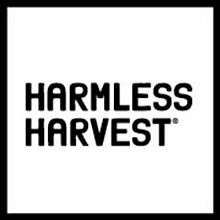Harmless Harvest
 | |
| Private | |
| Industry | Beverage |
| Founded | 2009 |
| Founder | Justin Guilbert and Douglas Riboud |
Key people |
Giannella Alvarez (CEO) Brad Paris (COO/CFO) |
| Products | Coconut water and iced tea |
| Website | http://www.harmlessharvest.com/ |
Harmless Harvest is a beverage company founded in 2009. It produces and sells coconut water as well as tea products.
Company overview
Justin Guilbert and Douglas Riboud founded Harmless Harvest in Brooklyn, New York in 2009.[1] The company originally set out to create a mass-market, sustainably wild-harvested beverage blend. However, the ingredient they believed would be the easiest to source, organic coconut water, proved to be the most challenging. This led the company to focus on coconut water. Harmless Harvest Raw Coconut Water debuted in 2011. It was initially sold exclusively at Whole Foods before spreading to additional retailers.[2] In 2012, the company moved its headquarters to San Francisco.[3][4]
In 2014, the company launched a line of bottled tea products called Namacha, as well as two additional flavors of coconut water, Cinnamon & Clove and Dark Cacao.[5][6] Harmless Harvest discontinued Namacha in 2015. Later that year, a third coconut water blend, Fair Trade Coffe, debuted at Whole Foods. The blend is made with fair-trade beans sourced from northwest Peru.[7] In 2015, the company rebranded its "100% Raw Coconut Water" as "Harmless Coconut Water". That year Giannella Alvarez became the company's CEO, and Brad Paris became CFO/COO. The founders remained with the company focusing on product development.[8]
Production
The organic coconut water for Harmless Harvest is harvested through sustainable means in Thailand, and sold in a raw, organic, and unpasteurized format. Company co-founder Justin Guilbert described to Time Magazine that, "It’s in my best interest that a farmer has the best life experience and gets the best advantage out of my experience with them."[9][10] Coconuts used by Harmless Harvest are not taken from the general market in Thailand, but rather through specific longterm relationships with specific groves and farmers.[11] Until 2015, bottles of Harmless Harvest Coconut Water undergo high-pressure processing rather than heat pasteurization to keep the product from spoiling.[5][12] That year the company began using a multi-step micro filtration instead.[13]
The founders stated they founded the company because, "Coconut has an unbelievable collective unconscious with incredible positive attributes. If you ask someone what he or she thinks of coconut, it’s generally positive stuff like “exotic” and “healthy.” Basically you’re on vacation. 99% of people have no clue about what coconut water tastes like in the first place, though. Essentially you can create a product called “coconut water,” which everybody is going to have a great, positive desire to try and buy, and sell something without any challenge that’s coconut water with a very diminished flavor. You can basically sell the equivalent of Sunny D and call it fresh-squeezed and no one would know any better. For us, that was kind of the perfect storm. On top of that, large companies like Coke and Pepsi were not only buying up small companies, but buying up sources and manufacturing too. So, we felt comfortable that they were going to do their job in educating an audience and creating a long-term category. We focused on redefining what coconut water tastes like."[14]
Recognition
In 2013 The Oakland Tribune placed Harmless Harvest coconut water first in a survey of coconut waters,[15] as did Food and Wine Magazine in a 2012 taste test.[16] Bon Appétit named Harmless Harvest its best electrolyte beverage of the year in 2013,[17] Harmless Harvest was named to the Saveur 100 in 2013,[18] and Better Homes and Gardens named it one of its new products of the year in 2014.[19]
References
- ↑ "Harmless Harvest: The whine and coconut". New York Magazine. September 19, 2013. Retrieved May 21, 2014.
- ↑ Kevin T. Higgins (April 1, 2012). "Better Processes, Healthier Foods: Fresh Foods and Sterile Processes Are Mutually Exclusive, but Technical Advances Are Putting the Best of Both Worlds within Reach". Food Engineering. Retrieved May 21, 2014.
- ↑ "Expo West spotlights emerging products". Beverage Industry. April 1, 2012. Retrieved May 21, 2014.
- ↑ "Green at Work: 5 Sustainable Companies You Should Work For". The Muse. October 2, 2013. Retrieved May 27, 2014.
- 1 2 "Harmless Harvest 100% Raw Tea". BevNet. Retrieved May 21, 2014.
- ↑ "Cinnamon & Clove Coconut Water". BevNET. October 9, 2013. Retrieved May 27, 2014.
- ↑ Ray Latif (March 3, 2015). "Harmless Harvest Calls New Coffee Variety "A Hydrating Pick Me Up"". BevNet.
- ↑ Jeffrey Klineman and Ray Latif (September 11, 2015). "Harmless Harvest Adds CEO, COO". BevNet.
- ↑ "Harmless Harvest Coconut Water". Saveur. January 28, 2013. Retrieved May 21, 2014.
- ↑ Krista Mahr (December 5, 2012). "Why the Coconut Craze Isn't Helping Farmers". Time Magazine. Retrieved May 21, 2014.
- ↑ Valerie Reiss (August 5, 2013). "Why some coconut water fans are losing it". Well and Good NYC. Retrieved May 21, 2014.
- ↑ "Harmless Harvest: Best Coconut Water". BevNET. Retrieved May 21, 2014.
- ↑ Ray Latif (March 22, 2016). "Harmless Harvest Execs Discuss Ending Use of HPP". BevNet.
- ↑ George Embiricos (November 18, 2014). "Why These Two Guys Are Changing The Crowded, Confusing Coconut Water Game". Food Republic. Retrieved March 16, 2015.
- ↑ Jolene Thym (November 4, 2013). "Taste-Off: The Best Coconut Waters -- and the Slimiest". Oakland Tribune. Retrieved May 21, 2014.
- ↑ Alex Vallis (July 24, 2012). "Best Coconut Water". Food and Wine Magazine. Retrieved May 21, 2014.
- ↑ Julia Kramer (November 22, 2013). "The BA Seal of Approval 2013: The 25 Products We Can't Cook (or Live) Without". Bon Appétit. Retrieved May 21, 2014.
- ↑ "Harmless Harvest Coconut Water". Savuer. January 28, 2013. Retrieved May 27, 2014.
- ↑ "Better Homes and Gardens Highlights Best New Product Awards 2014 Winners". Better Homes and Gardens. Retrieved May 21, 2014.
